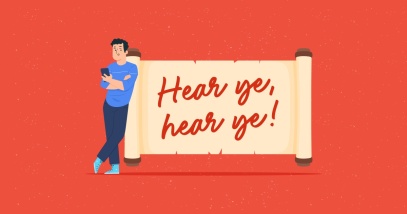Become and Other Words of Change

A living language is never fixed. Like its speakers, it is in a constant state of becoming. And that verb, become, and its synonyms including go, come, turn and get have each evolved to describe this central element of our evolutionary world, and have each cultivated individual particularities on the way. Why can we say that dreams come true and things go wrong, but not that dreams *go true and things *come wrong? Now that you’ve gotten curious, read ahead to become enlightened.
Terminology
First, let us familiarize ourselves with some terminology. Become is a type of copula, otherwise known as a linking verb. While standard transitive verbs take objects (for example the ball in hit the ball, and the dog in pet the dog), copulas connect a subject with something describing the subject itself. The most common copula is be (as in I am hungry or We are at home). Become and its synonyms are known as resulting copulas or process copulas.
Synonyms Coming Into Being
Since it is a verb denoting such a fundamental concept, become naturally has several synonyms, notably go, come, turn and get. Other than get, these synonyms all suggest motion, revealing a conceptual link between movement and change. In fact, become (or rather its etymon in Old English, becuman) originally meant “to come; to arrive; to reach”. In Old English, a completely different verb was used to denote becoming: weorþan. But this word disappeared, being replaced by becuman/become as it developed its modern sense over the course of late Old English and Middle English.1
Become and its synonyms may at first appear to be interchangeable and mean essentially the same thing. However, a closer look reveals differences in usage and extended meanings. This is the case for most groups of synonyms, as individual words take on specialized associations and idiomatic word pairings through centuries of usage. But become and its synonyms exhibit particularly striking differences in terms of their complements, to the point that it’s often unacceptable to replace one resulting copula for another. For example, we can say that someone’s face became red, turned red, went red or got red, but not *came red, and we say that a piece of knitting became unravelled, came unravelled or got unravelled, but not that it *turned unravelled or *went unravelled. Clues on such differences in usage can be found in dictionary definitions, but they are more deeply revealed in word combinations—like those in Antidote’s dictionary of combinations—which can expose patterns and connotations that English speakers sometimes do not know that they know. Word combinations are useful to both the English learner and the English native, and are increasingly being used in courts of law to argue the meanings of words in contracts and statutes.2 Let’s get smarter about the patterns of usage for become and its synonyms.
Become
Become is slightly formal in register, but versatile in attitude: it is used for favourable or neutral changes like become available and become evident, as well as for unfavourable changes as in become ill. It can take adjectives and nouns as complements, unlike copular go, come, turn and get, which almost exclusively take adjectives (except when turn is followed by the preposition into, as in turn into chaos). Become usually denotes a change that occurs gradually. As such, become combines with the adverb increasingly far more often than with suddenly.3
Not a having and a resting, but a growing and a becoming is the character of perfection as culture conceives it.
—Matthew Arnold, Culture and Anarchy (1869)
Go
This basic verb has many senses—more than twenty in Antidote’s dictionary—including our sense of interest, “to start to be in a certain condition”. Go usually denotes a deterioration in state:
go missing
go extinct
go limp
go blind
go haywire
The line went dead.
The bread went stale.
The victim went into shock.
This linking verb has many idiomatic expressions, including go green (“to become more environmentally friendly”) and go ham (“to put an incredible amount of effort into something”).
Come
Come is kindred to become, as it is derived from Old English cuman, the second portion of Old English becuman, the etymon of become.
Come as a linking verb denotes a change from a static to a more active state.4
come true
come awake
come unstuck
come clean “to admit to something” (informal usage)
Come usually describes a favourable change. And since the changes described by go are usually unfavourable, come and go can be seen as antonyms when they act as linking verbs, just as they are antonyms in their more literal directional senses.
Turn
Turn mainly takes colour and appearance adjectives as complements.5
The leaves turned brown.
His face turned pale.
My hair is turning white.
Night turned into day.
Turn can take complements describing an unfavourable change:
The protests turned violent.
The milk turned sour.
Turn is also used when someone gets older by another year:
I’m turning fifty this week.
Turn professional/pro and turn traitor are among the other idiomatic uses of this linking verb. Additionally, turn can be used without a complement to mean “to change”:
It’s been a tough winter, but things will turn after the spring equinox as the days get longer.
Marcus was kind until the wedding. After that, he turned.
Get
Get began being used as a synonym of become in the seventeenth century.6 As such, it is a relative newcomer but is now very popular and versatile.
get ready
get lost
get worse
get better
get lucky
get drunk
It’s getting late.
My mom got all “If your father hears about this” on me.
When the going gets tough, the tough get going.
Synonyms Grow Abundant
There are several other synonyms of become, including the following.
-
grow
grow old, grow impatient, grow more beautiful, grow sick with worry, etc.
-
fall
fall ill, fall in love, fall asleep, fall silent, fall due, etc.
-
end up
end up in tears, end up broke, end up pregnant, end up a winner, etc.
-
wind up
wind up dead, wind up in fourth place, wind up in jail, etc.
Some others are used in very restricted contexts.
spring open
break loose
wear thin
run wild
Her blood ran cold.
Here Comes the Conclusion
Becoming is a fundamental concept, and English has developed many ways to describe it. The distribution of complements among become, go, come, turn and get illustrates how word senses evolve to take on specialized roles and associations.
We hope that in reading this article some things have become a little clearer, that you’ve gotten a little wiser, and that your imagination has come alive.
-
Lowrey, Bian and Fabienne Toupin, Eds., Studies in Linguistic Variation and Change: From Old to Middle English. Newcastle Upon Tyne, Cambridge Scholars Publishing, 2015, pp. 166–170. ↩
-
Frankel, Alison. “‘Revolutionary’ linguistics tool awaits star turn in Supreme Court arbitration case.” Reuters, March 14, 2022. ↩
-
Dokoupil, Martin. Resulting Copulas and their Complements in British and American English: A Corpus Based Study. 2011. Palacký University Olomouc, student thesis, p. 27. Retrieved March 27, 2022. ↩
-
Biber, Douglas, Susan Conrad, Edward Finegan, Stig, Johansson and Geoffrey Leech. Longman Grammar of Spoken and Written English. Essex, Pearson Education Ltd, 1999, p. 445. ↩
-
Biber, Douglas, Susan Conrad and Geoffrey Leech. The Longman Student Grammar of Spoken and Written English Workbook. Essex, Pearson Education Ltd., 2002, p. 37. ↩
-
Lowrey, Brian et al., pp. 174–175. ↩




